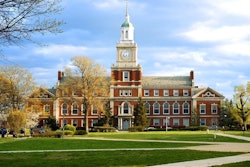WASHINGTON — On college campuses in virtually every state across the U.S., the Chinese government supports more than 100 institutes that teach language and culture. For university students like Moe Lewis, they offer a chance to learn about Chinese art and pick up a few phrases in Mandarin. For critics, like Republican Sen. Marco Rubio, they present a threat to academic freedom and a spy risk.
As tensions between the U.S. and China rise over trade and security, perceptions vary wildly about educational exchanges that have thrived since diplomatic relations were normalized four decades ago.
Increasingly, U.S. authorities are concerned that Chinese professors and students could exploit access to universities to gather intelligence and sensitive research — an issue a Senate judiciary panel will address Wednesday. And while the China-funded Confucius Institutes that have mushroomed worldwide since 2004 focus on benign subject matter, U.S. lawmakers are pushing for them to be more tightly regulated or even shuttered.
“I think every college should be aware of what these institutes are used for and that they are in fact consistently been used as a way to quash academic freedom on campus at the behest of a foreign government,” said Rubio, R-Fla. “I would encourage every college in America to close them. There’s no need for these programs.”
The view from the George Mason University campus a few miles outside Washington is much different. While institutes have sometimes been accused of squelching anti-Beijing views on issues like Tibet, Lewis, an undergraduate studying animation, said she’s seen no sign of intentional bias. She said the institute is one of her favorite places on campus.
“I think that it’s nice to have a lot of multicultural experiences especially with countries that (we) have tensions with,” said Lewis, after painting peony leaves with watercolors at a weekly art session where most attendees were Chinese students and the painting teacher was an American. “It’s important to learn about those places.”
The debate over Confucius Institutes has become a testing ground for the American response to China’s growing global reach, and underscores anxieties over the more than 350,000 Chinese who study in the United States, more than one third of all foreign students. Only around 20,000 Americans study in China.















